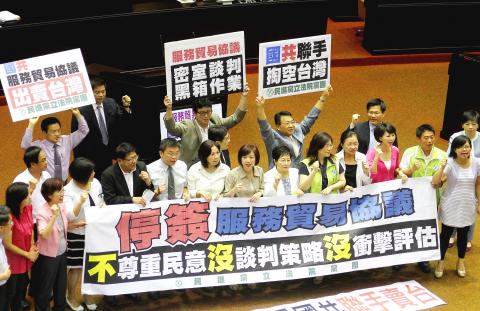Pan-green lawmakers occupied the floor of the legislative chamber yesterday morning with placards reading “the Chinese Nationalist Party [KMT] and the Chinese Communist Party [CCP] are hollowing out Taiwan’s [economy]” to protest the cross-strait service trade agreement that was signed yesterday afternoon.
As a result of the boycott, the plenary session, which had been scheduled to review a number of bills, was forced to adjourn until Tuesday.
“We paralyzed the meeting because the cross-strait service trade agreement was a backroom deal. We must reveal the truth to the public,” Taiwan Solidarity Union legislative caucus whip Hsu Chung-hsin (許忠信) said.

Photo: CNA
Hsu said the party demanded that the agreement be sent to the legislature for approval, not just for the record, and that Premier Jiang Yi-huah (江宜樺) present the agreement to the legislature to discuss its benefits and drawbacks with lawmakers.
“The agreement cannot become effective unless the legislature rectifies it,” Hsu said.
The Mainland Affairs Council had said that it would only submit the agreement on service trade to the legislature for record after the Executive Yuan approves it, citing Article 5 of the Act Governing Relations between the People of the Taiwan Area and the Mainland Area (台灣地區與大陸地區人民關係條例).
Under the article, cross-strait agreements which do not require any amendments to laws or any new legislation must be submitted to the Executive Yuan for approval and then to the legislature for record.
Legislator Lo Shu-lei (羅淑蕾) was one of the KMT lawmakers who vowed to rigorously review the agreement to assess how it would impact the nation’s service sector.
“Which sectors are likely to be harmed? The government should be open to the public about that,” Lo said.
KMT legislative caucus whip Lai Shyh-bao (賴士葆) said the party would not be against reviewing the trade pact in the legislature.
“We understand why the public has expressed concerns over the agreement. Their concerns need to be addressed,” Lai said.
Democratic Progressive Party legislative caucus whip Pan Men-an (潘孟安) said the agreement would affect the nation in a “destructive” way, with 72 percent of the nation’s service industry which employs 7 million workers being affected by the pact.
“It’s not that we oppose trade normalization with China, but Taiwan could lose its competitive edge as a result of the agreement. There is no shortage of funds, technology or workforce in service sectors in Taiwan,” Pan said.
Meanwhile, the People First Party (PFP) issued a press release saying that the legislature was vested with the power to rectify or abrogate the agreement.
The PFP added that it opposed lifting the cap on Chinese investment in sectors that would devastate local businesses and demanded that the government allocate sufficient funds to help businesspeople upgrade or transform their businesses and to assist local businesses in tapping Chinese markets as complementary measures to reduce negative impacts.
In response to media inquiries, Legislative Speaker Wang Jin-pyng (王金平) said he had no idea which sectors the trade pact would cover because the Mainland Affairs Council has never briefed him on the contents either.

Tropical Storm Gaemi strengthened into a typhoon at 2pm yesterday, and could make landfall in Yilan County tomorrow, the Central Weather Administration (CWA) said yesterday. The agency was scheduled to issue a sea warning at 11:30pm yesterday, and could issue a land warning later today. Gaemi was moving north-northwest at 4kph, carrying maximum sustained winds near its center of up to 118.8kph and gusts of 154.8kph. The circumference is forecast to reach eastern Taiwan tomorrow morning, with the center making landfall in Yilan County later that night before departing from the north coast, CWA weather forecaster Kuan Shin-ping (官欣平) said yesterday. Uncertainty remains and

SEA WARNING LIKELY: The storm, named Gaemi, could become a moderate typhoon on Wednesday or Thursday, with the Taipei City Government preparing for flooding A tropical depression east of the Philippines developed into a tropical storm named Gaemi at 2pm yesterday, and was moving toward eastern Taiwan, the Central Weather Administration (CWA) said. Gaemi could begin to affect Taiwan proper on Tuesday, lasting until Friday, and could develop into a moderate typhoon on Wednesday or Thursday, it said. A sea warning for Gaemi could be issued as early as Tuesday morning, it added. Gaemi, the third tropical storm in the Pacific Ocean this typhoon season, is projected to begin moving northwest today, and be closest to Taiwan on Wednesday or Thursday, the agency said. Today, there would likely

DISRUPTIONS: The high-speed rail is to operate as normal, while several airlines either canceled flights or announced early departures or late arrivals Schools and offices in 15 cities and counties are to be closed today due to Typhoon Gaemi, local governments announced last night. The 15 are: Taipei, New Taipei City, Taoyuan, Tainan, Keelung, Hsinchu and Kaohsiung, as well as Yilan, Hualien, Hsinchu, Miaoli, Chiayi, Pingtung, Penghu and Lienchiang counties. People should brace for torrential rainfall brought by the storm, with its center forecast to make landfall on the east coast between tonight and tomorrow morning, the Central Weather Administration (CWA) said. The agency issued a sea warning for the typhoon at 11:30pm on Monday, followed by a land warning at 11:30am yesterday. As of

CASUALTY: A 70-year-old woman was killed by a falling tree in Kaohsiung as the premier warned all government agencies to remain on high alert for the next 24 hours Schools and offices nationwide are to be closed for a second day today as Typhoon Gaemi crosses over the nation, bringing torrential rain and whipping winds. Gaemi was forecast to make landfall late last night. From Tuesday night, its outer band brought substantial rainfall and strong winds to the nation. As of 6:15pm last night, the typhoon’s center was 20km southeast of Hualien County, Central Weather Administration (CWA) data showed. It was moving at 19kph and had a radius of 250km. As of 3pm yesterday, one woman had died, while 58 people were injured, the Central Emergency Operation Center said. The 70-year-old